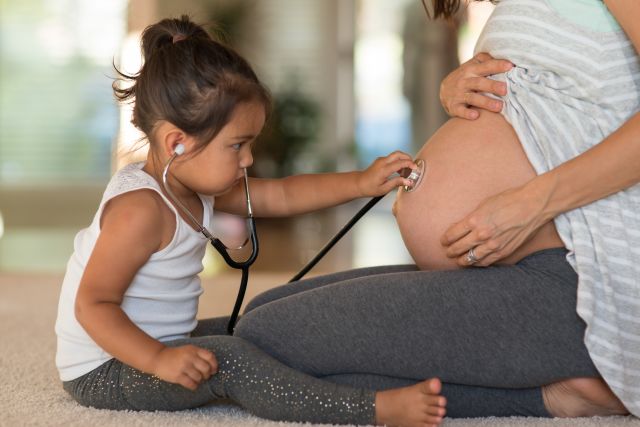Updated on March 18, 2024.
When you’re pregnant, everyone can seem like an expert. From the person at the grocery store who comments on your clothes to the friend who asks why you’re still dyeing your hair, it can feel hard to know what to avoid when you’re pregnant.
“Most activities that you could do before you’re pregnant you can keep doing while you’re pregnant,” says Adrian M. Roznowski, MD, an OBGYN at Plantation General Hospital and former medical director at Advanced Women's OB/GYN Institute of Broward in Plantation, Florida.
Of course, there are some activities you should definitely skip when you’re pregnant and breastfeeding, like smoking and drinking alcohol. For your own health and for the sake of your fetus, it’s important to stay tobacco-free. That means steering clear of second- and third-hand smoke, which is tobacco residue that has settled into things like carpet, clothes, paint, and bed sheets. And when it comes to drinking, the Centers for Disease Control and Prevention (CDC) points out that there is no known safe amount of alcohol, whether you are pregnant or trying to conceive.
To make sure you and your fetus stay as healthy as possible, here are a few other everyday activities that experts suggest you skip.
Vaping, using pot, and taking CBD
Vaping—smoking electronic cigarettes—is just a different delivery system for the same dangers of nicotine, says Dr. Roznowski.
Because e-cigarettes are a relatively new type of product, research on how they can harm the fetus is still emerging. But the fact is that e-cigs contain high amounts of nicotine—about the same amount found in traditional cigarettes. Nicotine intake during pregnancy has been linked to fetal damage of the immune system, brain development issues, and complications with the lungs and heart.
Aside from nicotine, there is concern about propellants and flavorings in e-cigarettes. These can be harmful to your growing fetus, contributing to the American College of Obstetricians and Gynecologists (ACOG) decision to recommend against them during the entire period of pregnancy. A 2023 review from researchers at the University of Alabama concluded that exposure to e-cigarettes during pregnancy can harm both the pregnant person and the fetus, potentially causing inflammation throughout your body, low birth weight, and preterm birth.
Pot (marijuana) usage is rising among pregnant people, according to research published in June 2019 in the Journal of the American Medical Association. Looking at self-reported data from the National Survey on Drug Use and Health (NSDUH), researchers found that 7 percent of pregnant women surveyed between 2016 and 2017 said they had used marijuana in the past month. This marked an increase from 2002, when 3.4 percent of pregnant women reported using pot during the past month. And stressful times can make the situation even more dire: A study in 2021 found that during the pandemic, marijuana use by pregnant women increased to more than 8 percent.
Though marijuana use is now legal in many states and is sometimes touted as a remedy for morning sickness, it is still harmful for fetuses, increasing the risk of stillbirth, low birthweight, and attention and behavioral problems in children.
Less is known about the effects of cannabidiol (CBD) on pregnant people and fetuses. CBD can be found in a wide variety of products from foot lotion to hard candies, and many people claim the chemical compound helps them deal with anxiety, pain, insomnia, and a long list of other medical conditions. Research is ongoing regarding CBD’s effectiveness as a treatment for a variety of health issues, however. There are also numerous questions and concerns about its safety. Because of this, the U.S. Food and Drug Administration strongly advises against CBD’s use for pregnant people.
Sitting in a hot tub or sauna
When your back aches or you’re dealing with other physical strains of pregnancy, sitting in a hot tub or sauna may sound soothing. But sitting in water at high temperatures can cause your body temperature to rise above 101 degrees, which is especially risky during the first half of your pregnancy. Elevated body temperatures have been linked to certain birth differences.
To ease your aching back, soak in a warm tub and use hot and cold compresses, suggests Roznowski. Though there has been some recent controversy around the topic of acetaminophen (Tylenol) in pregnancy, ACOG notes that the potential benefits of acetaminophen in pregnancy outweigh the risks, if used in consultation with your healthcare provider (HCP) and in moderation.
Cleaning the cat’s litter box
Cuddling with your tabby is perfectly fine during pregnancy, but let someone else scoop out the litter box. The risk here is toxoplasmosis, an infection which can be transmitted to your fetus if you accidentally come into contact with the T. gondii parasite in a cat’s feces. If that parasite reaches the fetus, it can cause complications including intellectual differences, blindness, and epilepsy (seizure disorder).
The risk that your cat may carry the parasite is much greater if it goes outdoors or eats raw meat. So, you should also avoid gardening or otherwise sticking your hands in the soil without gloves. That's especially important if your cat or other neighborhood felines roam in your yard.
“If you’re a cat owner and are really worried about toxoplasmosis, your doctor can test you for the antibodies in your blood,” says Roznowski. “That will tell you if you’ve previously been exposed to the parasite, in which case you will be immune to the infection now.”
Worth noting: T. gondii can also be found in raw or undercooked meat—particularly pork, mutton (sheep meat), and wild game, but also beef, poultry, and shellfish. So, make sure any meat you eat is fully cooked to an internal temperature of at least 160 degrees (165 for poultry) and avoid handling meat with your bare hands when cooking. Remember also to follow good kitchen cleanup practices, including carefully washing your hands, cutting boards, counters, and utensils after cooking with raw meats, seafood, and unwashed fruits and veggies.
Using certain acne medications and beauty products
You may have heard that dyeing your hair is a bad idea during pregnancy, but there have been relatively few studies done on the topic. Dyes are likely safe if you don’t have scalp irritation or breaks in your skin. If you’re concerned, talk to an HCP, or consider highlights instead of full color to minimize chemical exposure.
One type of beauty product you should skip for now, says Roznowski, is any prescription or over-the-counter skin product with retinol in it. Oral isotretinoin, in particular—found in several acne medications and commonly known as Accutane—carries a notable risk of birth differences and must not be taken during pregnancy. For newer, topical products known as third-generation retinols, the evidence is less clear that a fetus may be harmed if exposed during pregnancy, but most experts recommend avoiding these medications.
“Most dermatologists will ask patients if they are planning on getting pregnant before they prescribe these products,” says Roznowski, “but it’s always important to review all your prescriptions when you are pregnant to see if there is a safer option.”
Playing risky sports
Maintaining a regular fitness routine is one of the keys to having a smooth and safe delivery, says Roznowski. “Exercise keeps the blood flowing, so you reduce your risk of blood clots.” Plus, he adds, staying at a healthy weight reduces the risk of high blood pressure, preeclampsia (a pregnancy complication that causes high blood pressure and protein in the urine, and can potentially harm the parent and fetus), and gestational diabetes (high blood sugar levels during pregnancy). Pregnant people should aim for 2.5 hours of moderate-intensity aerobic physical activity such as brisk walking each week, spread across multiple days.
However, there are a few physical activities you should avoid. An obvious risk is any sport where there is a chance that you might get hit in the abdomen by a stick, bat, ball, or fist—such as contact sports like ice hockey, baseball, boxing, and soccer. It’s also wise to skip any sports where you could fall, like horseback riding.
Instead, stick with routines you love and already know how to do well, such as swimming, jogging, walking, dance, aerobics, and yoga. After the first trimester, however, you should avoid activities where you must lay on your back. Sit ups, for example, can drop your blood pressure and reduce blood flow to the fetus. Talk to your HCP about what kinds and intensity of exercise are right for you and when you may need to scale back.
Traveling late in pregnancy
Going on vacation can be a great way to relax before you deliver. As long as you don’t have any complications that need to be closely monitored by your HCP—including pre-eclampsia or multiples (twins, triplets, or more)—it’s usually fine to travel by plane, train, or automobile up to 36 weeks into your pregnancy. (Note that the cutoff can be earlier for international flights, sometimes around 28 weeks.) The ideal time to travel is during your second trimester, according to ACOG, since you will likely be past morning sickness, have more energy, and still far away from your due date.
Talk to your HCP about your travel plans, and avoid countries where there have been outbreaks of communicable diseases that could harm you or your fetus, such as Zika virus and malaria. The CDC also recommends that pregnant travelers be up-to-date on COVID vaccinations, including boosters. (Check out the latest travel advisories from the CDC.)
Get up and walk around frequently on long plane rides or take periodic stretch breaks on drives to lower the risk of blood clots called deep vein thrombosis (DVT). It’s also important to drink plenty of fluids to stay hydrated, and fasten your seatbelt when you’re in your seat.
Roznowski also recommends that pregnant people who travel should research where the nearest hospital is with a neonatal intensive care unit—just in case.







